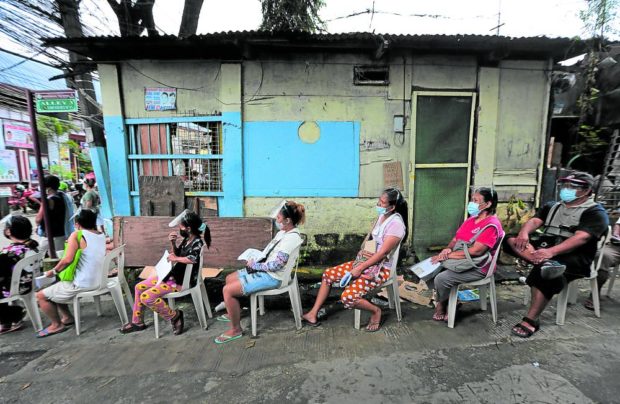
WAITING FOR AID In this photo taken in August, residents of Payatas village in Quezon City queue to receive cash aid from the government. —GRIG C. MONTEGRANDE
MANILA, Philippines — Congress should pass a supplemental budget that would ensure that revenue collected from fuel excise taxes expected to amount to over P100 billion this year would solely be used to fund assistance for Filipinos most affected by high oil prices.
Senatorial candidate and Sorsogon Gov. Francis Escudero made the call on Tuesday after the Department of Budget and Management (DBM) said it can only afford to fund the P500 monthly aid for poor families for at least three months.
“Since the government does not want to suspend the collection of excise taxes on petroleum, then the least it can do is provide financial assistance that will make a difference for poor families. Because P200 per month is nothing but a token for officials to be able to say they did something,” Escudero, who previously chaired the Senate finance committee, said in a statement.
Initially, President Rodrigo Duterte approved the Department of Finance’s (DOF) recommendation of providing P200 monthly aid. He eventually asked this amount to be increased to P500.
“The revenue from all taxes on fuel should provide for people’s needs, and we need to hold the government accountable. This is why I’m pushing for a supplemental budget based on these tax collections. We do not know how long we will live with the impact of these oil price hikes,” Escudero went on.
READ: DOF nixes fuel excise tax suspension, proposes P200 monthly aid to poor families
In pushing for Congress to pass a supplemental budget, Escudero said that aside from the excise tax on fuel under the Tax Reform for Acceleration and Inclusion law, the government also collects a 12-percent value-added tax (VAT) on petroleum products.
From January to February, revenue from excess VAT was P3 billion, and it is projected to reach P20 billion this year with the Dubai crude oil prices at $100 per barrel, according to the former senator.
Crude oil is now $120 per barrel, he also noted.
“It’s not right for the government to make money on the backs of its already burdened populace and then to distribute only crumbs to the people who are paying the price for a deregulated oil industry that has allowed oil companies to easily raise fuel prices,” Escudero added.